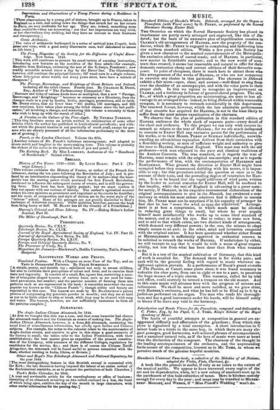Standard Edition of Handers Works. Deborah, arranged for the Organ
or Pianoforte (with Vocal score) by G. PERRY, as performed by the Sacred Harmonic Society, E.veter Hall.
THE Oratorios on which the Sacred Harmonic Society has placed its imprimatur are partly newly arranged and engraved, like this of De- borah ; but the basis of its extensive plan of republication consists in CLARKE'S old arrangements of HANDEL, now the property of the con- ductor, which Mr. PERRY is engaged in completing and fashioning into one uniform standard edition. Within a few years this Society has given a new character to the musical entertainments of the Metropolis: the exclusive admirers of sacred music, and of HANDEL in particular, now muster in formidable numbers ; and to the new world of ama- teurs thus created, it seems but reasonable and natural to offer for their domestic recreation cheap and correct editions of their favourite com- poser. In point of cheapness, there is much here to attract those who like arrangements of the works of HANDEL, or who are not competent to exercise any choice in that particular. The choruses in Deborah exhibit a fair score—open, clear, and correct—well-fitted to sing from over the shoulder of an accompanyist, and with the voice parts in their proper clefs. In this we rejoice to recognize an improvement on CLARKE, and a testimony in favour of general choral progress. The airs, esc., of which a great proportion are uninteresting, are seen to less ad- vantage in an arranged form : indeed, to bring Deborah within reasonable compass, it is necessary to retrench considerably in this department. The renewed favour, however, which the late admirable performance of that oratorio has acquired for HANDEL, is not in the least likely to suffer from the most minute examination of the choruses.
We observe that the plan of publication in this standard edition Of HANDEL embraces the whole stock of separate parts—every detail of the choir and orchestra. To this project we can only wish success in- asmuch as relates to the text of HANDEL; for we are much indisposed to concede to Exeter Hall any exclusive patent for the performance of his works, or to view Messrs. PERRY or SURMAN individually, notwith- standing an adventitious reputation derived from their connexion with a flourishing society, as men of sufficient weight and authority to give the tone to HANDEL throughout England. This must rest with the old professors—with men educated in the pure and classical traditions of the Ancient Concerts. The true standard, as it regards the text of HANDEL, must remain with the original manuscripts; and RS it regards the performance of him, with the contemporaries of HARRISON and BARTLEmAN. What ground the direction at Exeter Hall might have occupied before they commenced dabbling with his scores, it is impos- sible to say ; but that procedure settled the question at once as to the amount of their taste, and the prevailing degree of veneration for HAN- DEL. It is to be hoped that the vapid additions of wind parts, written by the leader to several oratorios for Exeter Hall, will be confined to that locality, while the rest of England is advancing in a purer taste: for surely, if MOZART, in his exquisite instrumental elaborations of the original accompaniments to airs in the Messiah, has awakened a con- troversy in which his most ardent admirers find it difficult to sustain him, Mr. PERRY must not be surprised if in his capacity of arranger he find that he has "sown the wind to reap the whirlwind." Arrange- ment is at best a compromise, in which much must be allowed in reducing great things to small, but where he ever acquits himself most satisfactorily who works up to some ideal standard of the master, and as under his eye. But to reduca to some new form, and to add to that which exists, are two distinct kinds of arrangement, which demand very different powers ; in the one, the science to adapt simple means to an end ; in the other, mind and invention congenial with the original author. It has been questioned whether either SPORE or MENDELSSOHN is sufficiently approved in orchestral renown to be solicited to retouch the works of HANDEL. If undertaken by either, we will venture to say that it would be with a sense of great respon- sibility, not less from what has been done than from what remains to do.
But it is a test of the musical cultivation of Germany, that this kind of work is uncalled for. The demand there is for works pure; and such will be the general feeling with regard to music wherever en- lightened opinion prevails. In a performance of BAca's grand oratorio of The Passion, at Cassel, some years since, it was found necessary to redouble the oboe parts, from one to eight or ten to a part, to penetrate the huge masses of a triple chorus. This resource, called for by trial and effect, could scarcely be termed a trespass on the old master. And to this state music will advance here w WI the progress of science and refinement. We shall be more and more satisfied, as we grow older, with HANDEL'S orchestra, and what he has left to be filled up in it by a judicious performer on the organ. The man who reads his thorough- bass and has a good instrument under his hands, will be himself solely to blame if he leave any void in the harmony.






















 Previous page
Previous page